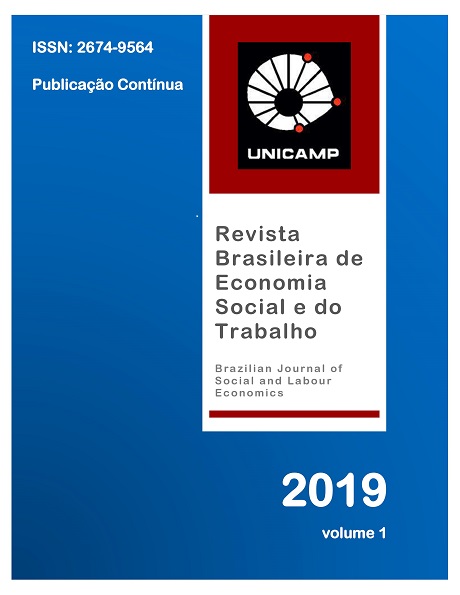Abstract
This text studies the impact of the economic crisis on the Spanish labour market in comparative perspective, with the large southern Mediterranean countries of Europe and the UE 28 average (as a general compendium of all member countries) and the UE 15 (as a representative average of the oldest member states and most developed countries). The starting point is the changes in the economy (expressed in GDP evolution), and their impacts on the labour market. Subsequently, the institutional reforms that occurred in the labour legislation are analysed. Considering employment and unemployment indicators, statistics in Spain are worse than EU 15 averages and show a lower improvement in the economic recovery period. In turn, labour market reforms aimed to address the economic crisis have not led to the introduction of new policies or the reduction of precarious work.
References
Alonso, L. E. (2007). La crisis de la ciudadanía laboral. Barcelona: Anthropos.
Baccaro, L., & Pulignano, V. (2011). Employment relations in Italy. In G. Bamber, R. Lansbury, & N. Wailes (Eds.). International and comparative employment relations (pp. 138-168). 5 ed. Los Angeles: Sagepub.
Baylos, A. (2014). Negociar en crisis. Negociación colectiva en los países del sur de Europa. Albacete: Bomarzo.
Colombo, S., & Regalia, I. (2016). Changing joint regulation and labour market policy in Italy during the crisis: On the edge of a paradigm shift? British Journal of Industrial Relations, 22(3), 295-309. doi:10.1177/0959680116643434.
Gómez, M. V. (2018, 13 Diciembre). El anuncio de un pacto para derogar parte de la reforma laboral indigna a la patronal. El País, Economía. Obtenido en: https://elpais.com/economia/2018/12/13/actualidad/1544699656_356170.html.
Gómez García, F., & Prieto Rodríguez, M. (2003). Factores explicativos del diferencial del desempleo andaluz. Revista del Ministerio de Trabajo y Asuntos Sociales, 46, 143-167. Obtenido en: http://www.mitramiss.gob.es/es/publica/pub_electronicas/destacadas/revista/numeros/46/Informes05.pdf.
Leonardi, S. (2016). L’impatto della nuova governance europea sulla contrattazione collettiva. Un confronto fra Italia, Spagna e Portogallo. Quaderni di Rassegna Sindacale, 2016(1), 147-172. Obtenido en: https://www.fondazionedivittorio.it/sites/default/files/content-attachment/Qrs%201_2016_Leonardi-1.pdf.
Martínez Lucio, M. (2008) ¿Todavía organizaciones del descontento? Los retos de las estrategias de renovación sindical en España. Arxius de Sociologia, 18, 119-133. Obtenido en: https://www.uv.es/sociolog/arxius/ARXIUS%2018/09.%20MARTINEZ.pdf.
Martínez Lucio, M. (2016). Incertidumbre, indecisión y neoliberalismo emergente. El papel dual y complejo del Estado español en las relaciones laborales y de empleo. Sociología del Trabajo, nueva época, 87, 68-88. Obtenido en: https://recyt.fecyt.es/index.php/sociologiatrabajo/article/view/52263/31847.
Molina, Ó. (2005). Political exchange and bargaining reform in Italy and Spain. European Journal of Industrial Relations, 11(1), 7-26. doi:10.1177/0959680105050397.
Molina, Ó. (2007). State and regulation of industrial relations in Spain: Old wine in a new governance bottle? South European Society & Politics, 12(4), 461-479. doi:10.1080/13608740701731390.
Molina, Ó. (2014). Self-regulation and the state in industrial relations in Southern Europe: Back to the future? European Journal of Industrial Relations, 20(1), 21-36. doi:10.1177/0959680113516404.
Oliet Palá, A. (2000). La concertación social en la transición: la génesis de un modelo de intercambio. Espacio, Tiempo y Forma (Serie V, Historia Contemporánea), 13, 441-480. doi:10.5944/etfv.13.2000.3019.
Prosser, T. (2014). Financialization and the reform of European industrial relations systems. European Journal of Industrial Relations, 20(4), 351-365. doi:10.1177/0959680113505178.
Rocha, F. (2014). Crisis and austerity policies in Spain: towards an authoritarian model of industrial relations. In F. Rocha (Ed.). The new EU economic governance and its impact on the national collective bargaining systems (pp. 175-204). Madrid: Comisiones Obreras.
Sánchez-Mosquera, M. (2014). La concertación social en Europa occidental ante tres crisis económicas, 1973-2010. Historia del Presente, 24, 143-156. Obtenido en: https://idus.us.es/xmlui/handle/11441/66945.
Sánchez-Mosquera, M. (2016). Concertación social y transición a la democracia en la Península Ibérica. Un análisis comparado del corporatismo en España y Portugal, 1976-1986. Revista de la Historia de la Economía y de la Empresa, 10, 321-342. Obtenido en: https://idus.us.es/xmlui/handle/11441/67049.
Sánchez-Mosquera, M. (2018). Trade unionism and social pacts in Spain in comparative perspective. European Journal of Industrial Relations, 24(1), 23-38. doi:10.1177/0959680117711476.
Santos Ortega, J. A. (2003). La invasión de la ideología empresarial en los márgenes del mercado de trabajo: inseguridad laboral, paro e inserción. Cuaderno de Relaciones Laborales, 21(1), 107-128. Obtenido en: https://revistas.ucm.es/index.php/CRLA/article/view/CRLA0303120107A/32398.
All content of the journal, except where identified, is licensed under a Attribution-NonCommercial-ShareAlike 4.0 International. The Journal adopts the Open Access model, allowing anyone to download texts, read, copy and disseminate for academic purposes free of charge.

